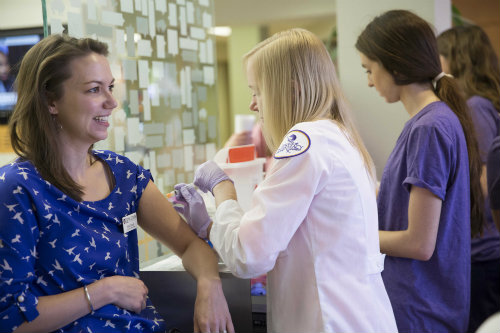The College of Pharmacy & Health Sciences is offering flu vaccination clinics throughout the month of October to raise awareness for American Pharmacist Month.
According to Lipscomb Nurse Practitioner Andrea Hardison, “flu season” is from early October through the end of February. She said that as the weather changes, more people become susceptible to the virus, which is easily spread by carriers.
“The flu can come on suddenly, and it is more severe with worse complications than the common cold if people do not take care of themselves and work to prevent it,” Hardison said. She added that antibiotics are not effective in treating either the cold or the flu.
According to the World Health Organization, over 200,000 people nationwide are hospitalized from flu complications each year, and it is estimated that 250,000-500,000 people worldwide die each year as a result of flu.
Hardison said those at highest risk of the flu include pregnant women, seniors over age 65 and children under age 5. However, in her opinion, college students should always take precautions because they are still at risk.
“Students should still be concerned about contracting the virus because although they are not at as high of a risk, they may come into contact and transmit the virus to those most at risk,” Hardison said. She noted that by taking the flu vaccine, a person can prevent spreading the virus.
Hardison warned that some get the flu virus confused with the stomach virus.
“They are two totally different viruses” Hardison noted. “Nausea, vomiting and headaches do not necessarily mean you have the flu.” She added that in cases where there is a question, it is wise to seek a medical opinion.
Hardison also noted that there are many inaccurate myths concerning the flu vaccine. One misunderstanding is the common belief that the flu vaccine actually causes the flu.
She said the flu virus that is used in the vaccine is “inactive;” therefore, it’s unable to give someone the flu. Reactions to the vaccine are generally mild, typically including no more than a soreness at the site and a low-grade fever. Oftentimes, Hardison said that people may confuse a reaction to the virus with contracting the flu. Very rarely, she noted, is there an allergic reaction.
Vaccines will be made available to Lipscomb Students and Faculty and Staff at discounted rates. The cost of student vaccination is $20 for the Quadrivalent flu shot (regular). The Lipscomb flu clinic will also offer the Preservative-free vaccine for patients who are pregnant or allergic to Thimerosal for $30 and the High-dose vaccine for the elderly for $35. In addition to these vaccinations, the Flumist nasal spray will also be available for $30 as well as the Egg-free flu shot for $35.
Lipscomb full-time faculty and staff receive the vaccines for free, and spouses of Lipscomb’s full-time staff get a discounted rate of $12. Cash, check and credit cards are accepted.
The clinics will continue to run through October 7, 2016 from 11 am – 2 p.m. They will be located outside of Burton Health Sciences Center. They will additionally be offered Friday, October 7, 2016 at the Faculty/Staff Picnic.
For more information or questions about Lipscomb’s vaccine clinics, email healthservices@lipscomb.edu, or call 615-966-6304. For more information on state-wide virus statistics, including detailed information and prevention measures, call 1-800-CDC-INFO.
Photo courtesy of Lipscomb University

